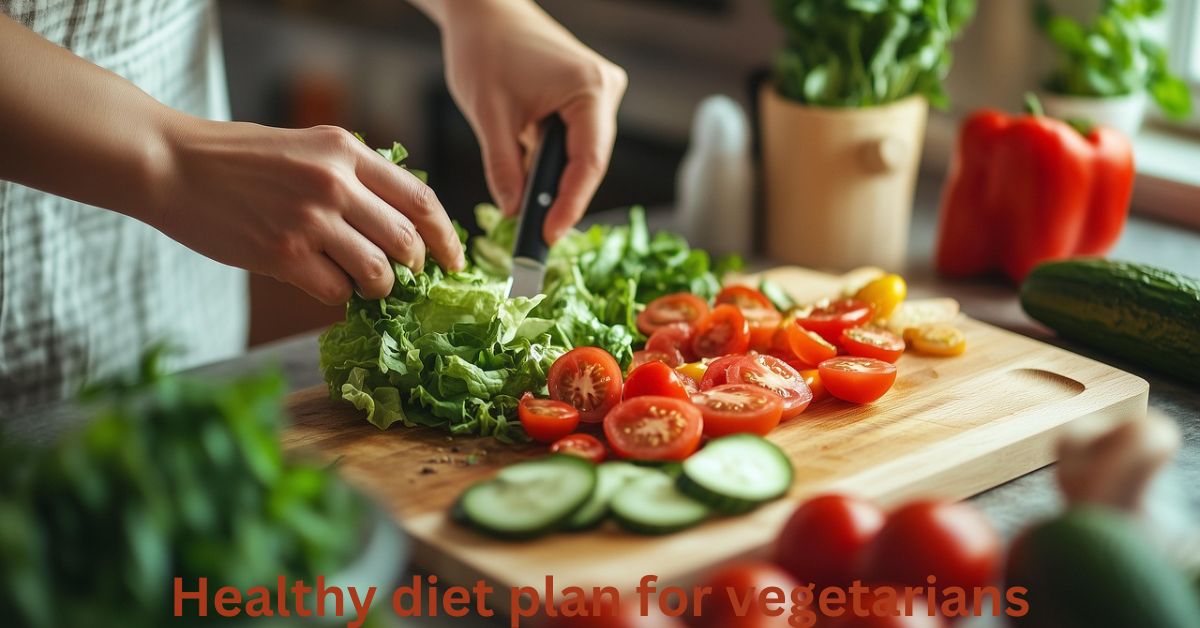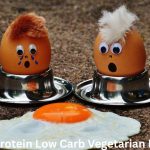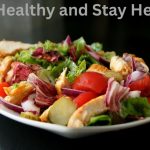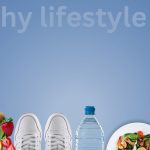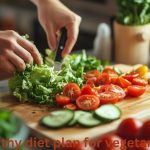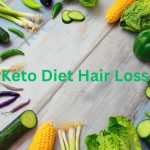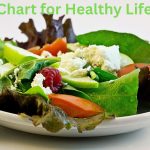Welcome to Healthy Diet Balance, your trusted global resource for nutrition and wellness! If you are searching for a healthy diet plan for vegetarians to eat well while avoiding meat, this useful guide is for you.
If you are living in the USA, Europe, Asia, and beyond, we will offer a comprehensive and scientifically-backed diet program with practical advice and strategies for becoming vegetarian in 2025.
Let’s begin to create the perfect healthy eating plan for vegetarians as well as a healthy diet plan for vegetarians!!!
Why a Healthy Diet Plan for Vegetarians Is Essential
Vegetarian diets are increasing in popularity across the globe and 10-15 percent of people switching to diets that are based on plants, according to the World Health Organization (WHO).
A properly planned healthy diet plan for vegetarians will ensure you receive the most essential nutrients, while reducing the risk of coronary heart diseases by up to 25 percent (American Heart Association).
In 2025, as the popularity of vegetarianism expands across all cultures, this guide provides an innovative, practical strategy to meet your requirements without compromising the taste or nutritional value.
Global Appeal of Vegetarian Diets
From India’s rich tradition of lentils to Europe’s innovations based on plants, A healthy diet plan for vegetarians is able to adapt to different dishes, making it accessible all over the world.
Engaging Start: Your Vegetarian Journey
Imagine delicious meals that can provide energy for your day. What is your favorite vegetarian meal? Let us know in the comments and let’s start!
VISIT ON- Best Healthy Diet Plan for Women: A Comprehensive Guide for 2025
The Science Behind a Healthy Diet Plan for Vegetarians
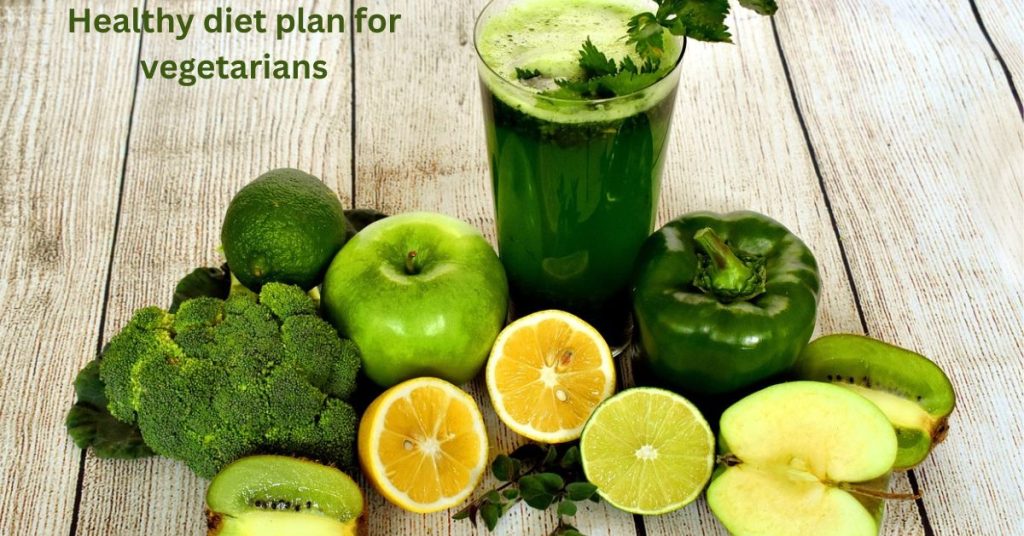
Let’s examine the science behind the healthy diet plan for vegetarians using research conducted from the National Institutes of Health (NIH) as well as other sources.
What Makes a Vegetarian Diet Healthy?
The healthy diet plan for vegetarians concentrates on food that is rich in nutrients that can replace meat
- Macronutrients: 45-55% carbs, 15-25% protein, 25-35% fats (USDA).
- Protein sources: Beans, lentils tofu, tofu, and dairy (or alternative sources) to achieve 0.8-1.2 grams of total body mass (e.g. 48-72 g for a person weighing 60 kg).
- Micronutrients: The focus is specifically on the iron (18 mg/day, for females and 8 mg for males) B12 (2.4 mg/day) as well as calcium (1000 mg/day) (NIH).
How It Impacts Your Body
- energy balance: Complex carbs (e.g. and Quinoa) give you energy for a long time, while proteins aid in maintaining muscle health.
- Gut Health: Foods high in fiber (25-30 grams/day), such as beans, help to build healthy microbiomes, which are associated with immunity (NIH).
- Heart Health: Plant-based fats (e.g. avocado) reduce LDL cholesterol by 10 to 15 10% (Harvard Health).
Scientific Evidence
- The Management of Weight: Vegetarians are 15% lower risk of obesity (Journal of the American Academy of Nutrition and Dietetics 2023).
- Disease Prevention: Lowers the risk of developing diabetes by 20 percent and heart disease risk by 25 25% (WHO).
- Longevity: adds about an additional 1-2 years to your life expectancy if you eat a balanced diet (Harvard Health).
Benefits of a Healthy Diet Plan for Vegetarians
A healthy diet plan for vegetarians offers transformative benefits:
- Healthy Weight Loss: High-fiber foods promote the feeling of fullness, which can lead to 5 to 7 percent weight loss over the course of 6 months (CDC).
- Heart Health: Lowers blood pressure by 5-10mmHg (American Heart Association).
- Improved Digestion: Fiber-rich diets reduce bloating by 15% (NIH).
- environmental impact: Reduces emissions of carbon by 20 percent in comparison to diets with a high proportion of meat (WHO).
- Mind Clarity: The effects of nutrient-dense food on mood by 10 percent (European Journal of Nutrition).
Cultural Benefits
In India vegetarian diets containing lentils help in managing diabetes While in Italy plants-based Mediterranean foods help improve heart health.
Engaging Tip: Imagine your most healthy self. What benefits interest you the most? Tell us in the comments in the comments below!
Challenges of Following a Healthy Diet Plan for Vegetarians
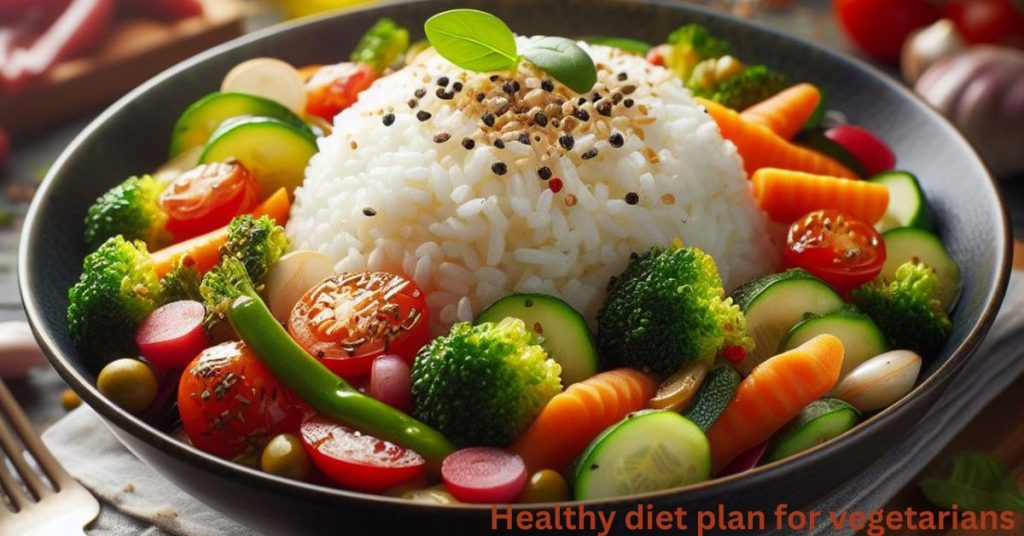
Vegetarian diets have challenges:
- Nutritional Deficiencies: Risk of having low levels of iron, B12 and protein if they are not managed carefully (NIH).
- Food Variety: A lack of choices can result in monotony. 20 percent of vegetarians complain of boredness (Journal of Nutrition).
- Social barriers: Dining out or eating out with family members may not have vegetarian choices.
- Cost: Specialty products such as plant-based proteins may be 10% to 20% more expensive (USDA).
Engaging Tip: Faced a vegetarian diet challenge? Let us know how you fought it!
How to Create a Healthy Diet Plan for Vegetarians
Let’s create a healthy and balanced diet strategy for vegetarians by following these steps.
Step 1: Assess Your Needs
- Goals: Weight management and energy or general well-being?
- The current diet: Record meals for each week to determine the gaps.
- Health check: Test for iron deficiencies or B12 If necessary.
Step 2: Design Your Plan
- 50% Veggies/Fruits: Spinach, broccoli, berries.
- 25% Proteins: Lentils, tofu, eggs, dairy.
- 25 Carbs %: Quinoa, brown rice Oats, brown rice.
- Fats: Olive oil, nuts, avocado.
Step 3: Sample Daily Plan
- Breakfast (400-500 kcal): Oatmeal with Chia seeds and fruit.
- Snack1 (150-200 calories): Greek yogurt with almonds.
- lunch (600-800 Kcal): Lentil soup with whole-grain bread and spinach.
- Snack 2. (150-200 calories): Apple with peanut butter.
- Dinner (500-700 Kcal): Tofu stir-fry with broccoli and quinoa.
Step 4: Build Healthy Habits
- Weekly meal prep to make it easier to prepare meals weekly and.
- Utilize fortified food items (e.g. fortified almond milk with B12).
- Drink plenty of water (2-3 Liters/day).
Engaging Tip: Try a “Vegetarian Week”-share your Day 1 on (@healthydietbalance)!
7-Day Healthy Diet Plan for Vegetarians
Here is an innovative healthy diet plan for vegetarians with global flavours without meat.
Calorie amounts are approximate, aiming for 1800-2200 kcal/day.
Day 1
- Breakfast Oatmeal with Chia seeds as well as berries along with almond milk (450 calories, 15 grams protein).
- Snack1: Greek yogurt with walnuts (200 calories, 10 grams protein).
- lunch: Lentil soup with whole-grain bread and spinach (700 calories, 25 grams protein).
- Snack2: Apples and peanut butter (200 kcal, 5g protein).
- Dinner: stir-fry made of tofu, broccoli and quinoa (600 kcal, 20g protein).
- Total: ~2150 kcal, 75 g protein.
Day 2
- Breakfast: Smoothie (spinach, banana, almond milk, protein powder) (400 kcal, 20 g protein).
- Snack1: Cottage cheese containing pineapple (150 kcal, 10g protein).
- Lunch: Chickpea salad the quinoa and kale (750 calories, 25 grams protein).
- Snack2: Almonds and dried Apricots (200 kcal, 5g protein).
- Dinner: Curry made of vegetables and brown rice (600 calories, 15 g protein).
- Total: ~2100 kcal, 75 g protein.
Day 3
- Breakfast: Scrambled eggs topped with whole-grain toast and spinach (450 kcal, 20g protein).
- Snack1: orange along with a couple of Pistachios (150 kcal, 5g protein).
- Lunch: Wrap of black beans filled with avocado, salsa (700 calories, 20 grams protein).
- Snack 2: Protein bar (200 kcal, 10 g protein).
- Dinner: Grilled tofu served with asparagus and couscous (600 calories, 20 grams protein).
- Total: ~2100 kcal, 75 g protein.
Day 4
- Breakfast: Chia pudding mixed with coconut milk, and fruits (400 calories, 10 grams protein).
- Snack 1: Greek yogurt with Chia seeds (200 kcal, 10g protein).
- Lunch: Veggie noodles (zucchini noodles) with tomato sauce and parmesan (750 calories, 20 grams protein).
- Snack 2: Carrot sticks topped with Hummus (150 calories, 5 grams protein).
- Food: Lentil patties with sweet potato and Kale (600 calories, 20 grams protein).
- Total: ~2100 kcal, 65 g protein.
Day 5
- Breakfast: Toast made from whole grains served with poached eggs and avocado (450 calories, 20 g protein).
- Snack 1: Smoothie (mango, protein powder, almond milk) (200 kcal, 15 g protein).
- Lunch: Tofu and vegetable stir-fry made with brown rice (700 calories, 20 grams protein).
- Snack 2: Walnuts and dried Cranberries (200 calories, 5 grams protein).
- dinner: Chickpea stew with spinach and the quinoa (600 kcal, 20g protein).
- Total: ~2150 kcal, 80 g protein.
Day 6
- Breakfast: Oatmeal containing the flaxseeds as well as banana (400 calories, 10 grams protein).
- Snack 1: Cottage cheese topped along with slices of peach (150 calories, 10 grams of protein).
- Lunch: Wraps of vegetables with Hummus and Quinoa (750 calories, 20 g protein).
- Snack 2: Protein shake containing almond milk (200 calories, 15 g protein).
- Dinner: Grilled eggplant, spinach and couscous (600 calories, 15 grams protein).
- Total: ~2100 kcal, 70 g protein.
Day 7
- Breakfast: Smoothie (berries, spinach, protein powder, almond milk) (450 kcal, 20 g protein).
- Snack 1: Greek yogurt with almonds (200 calories, 10g protein).
- Lunch: Lentil and vegetable soup made with whole grain bread (700 calories, 25 grams protein).
- Snack 2: Apples and peanut butter (200 calories, 5 grams protein).
- Dinner: Tofu curry served with broccoli and brown rice (600 calories, 20 grams protein).
- Total: ~2150 kcal, 80 g protein.
Customization Tips
- Set calories based on your the level of activity.
- Switch proteins (e.g. tofu vs. lentils) to meet your preference.
- Add cultural spices (e.g., cumin, turmeric).
Engaging Tip: Begin the plan and share Day 1 on [X] using #VegetarianDietPlan!
Common Myths About a Healthy Diet Plan for Vegetarians
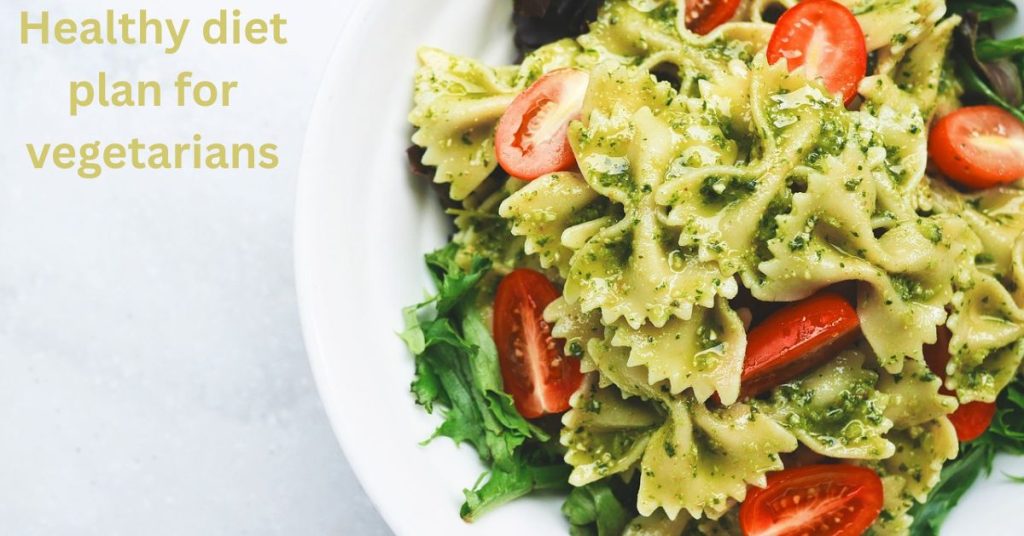
Let’s debunk myths:
- Myth 1: Vegetarians Can’t Get Enough Protein
- Fact: Plant-based sources like lentils provide ample protein (NIH).
- Myth 2: Vegetarian Diets Are Expensive
- Fact: Beans, staples, and rice are cost-effective (USDA).
- Myth 3: You’ll Always Feel Hungry
- Fact: Foods high in fiber promote feelings of satiety (Harvard Health).
Engaging Tip: Heard a vegetarian diet myth? Post it here!
Practical Tips for a Healthy Diet Plan for Vegetarians
- Menu Prep: Make batches of food (e.g. lentil soups) for the entire week.
- Fortified Foods: Make use of B12-fortified dairy products or plant milks.
- Variety: Alternate the proteins (e.g. beans, tofu) to prevent boredom.
- track nutrient levels: Cronometer is a tool to track iron, B12 and protein.
- Supplements: Take B12 (2.4 mg/day) or iron, if you need it. Consult your doctor.
Expert Insight
“Dr. Priya Sharma, a dietitian with over 12 years of experience, says “A healthy diet for vegetarians is based on variety. Make sure that you’re getting the right nutrients each day.”
Healthy Diet Plan for Vegetarians and Technology in 2025
Tech is here to help you on your way:
- Applications: MyFitnessPal to track your fitness, HappyCow for finding vegetarian alternatives.
- Intelligent Tools: Smart scales that track the progress.
- Online support: Join the vegetarian community on [X].
Engaging Tip: Share your most loved vegan app with us in the comment section!
FAQs on Healthy Diet Plan for Vegetarians
- Q: How can I make sure that I have enough protein?
- A: include tofu, lentils and dairy. Try to achieve 0.8-1.2 grams per kilogram of body weight.
- Q: Do I have to eat out as vegetarian?
- A: yes, search for alternatives that are plant-based, or make your own meals.
- Q: Will I require supplements?
- A: It may be related to B12 or iron. Consult a doctor.
The conclusion: Thrive by implementing the healthy diet plan for vegetarians
The healthy diet plan for vegetarians allows you to live your best life into 2025.
Here at Healthy Diet Balance, we are here to help with expert guidance and captivating content.
Start by following our 7-day plan to share your progress and grow worldwide.
Check us out for more information or follow us on – HEALTHY DIET BALANCE…
